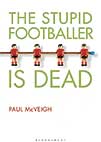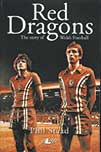{youtube}Mnxhlm3hEmc{/youtube}
{youtube}A-R9JaqWQpU{/youtube}
{youtube}GBbXjhBPWRI{/youtube}
 by Paul McVeigh
by Paul McVeigh
Bloomsbury, £14.99
Reviewed by Ashley Clark
From WSC 319 September 2013
Since his retirement from football in 2010, diminutive former Norwich City midfielder and Northern Ireland international Paul McVeigh has worked hard to create a brand for himself. A regular pundit on TV and radio, he also treads the speaker’s circuit and has co-founded the company ThinkPro alongside sports psychologist Gavin Drake, which trails itself on its website as an “Elite Performance Development Programme”. It’s all a long way from the days when ex-pros simply bought pubs when their playing days were done.
McVeigh’s first book – the alarmingly titled (but largely uncontroversial) The Stupid Footballer Is Dead – is constructed as a 12-step guide for professional and aspiring footballers aiming to realise their potential and develop successful careers. Based largely around McVeigh’s thesis that mental strength is gradually replacing the need for physical strength in modern football, it is clearly structured and easy to follow, as each chapter concludes with a case study and a capsule summary of its key points. However, it is sometimes repetitive and better consumed in chunks rather than one sitting.
Though one’s overall enjoyment and appreciation of The Stupid Footballer will likely hinge on their level of tolerance for the near-messianic tone and buzzword-heavy language of the self-help industry (when McVeigh glowingly mentions Paul McKenna, he’s not talking about the ex-Preston North End midfielder), much of the book’s content is undeniably salient. In chapters with titles such as “Define and follow goals”, “Create a helpful self-image”, and “Think about thinking” he offers a host of practical suggestions filtered through his own wealth of professional experience. McVeigh is not shy of the occasional critique, either – he is particularly scathing of England’s 2010 World Cup squad, who he castigates for their lack of positivity, and has some choice words regarding Joey Barton’s perceived lack of professionalism.
McVeigh comes across as likeable enough but he often lapses into cliche, while an occasional lack of self-awareness in his choice of language bleeds through. When, in the final chapter (“There is life after football”), he boasts of having “delivered stand-up comedy”, it’s impossible not to think of David Brent. Another unintentional laugh-out-loud moment arrives when McVeigh describes Pisa FC as having “failed to sign him”, rather than him “failing to secure a contract”; this kind of lacuna in logic is perhaps a corollary of the bulletproof self-confidence he’s engendered in himself through practising what his book preaches. That said, McVeigh is candid about some of his earlier career mistakes (often involving a drink or two) and offers welcome slivers of personal information about his upbringing in Belfast against the backdrop of the Troubles.
Ultimately, even though its content is hardly revolutionary, it’s not too much of a leap to say that The Stupid Footballer Is Dead, with its neatly pedagogical structure, could come to be used as a key text for coaches looking to help focus the minds of young players across the country. However, it remains to be seen whether the current generation of English footballers, who McVeigh characterises as being hooked on Xbox, will pay it much attention.
 The story of Welsh football
The story of Welsh football
by Phil Stead
Y Lolfa, £14.95
Reviewed by Huw Richards
From WSC 319 September 2013
The condition of Welsh football is often serious but never dull, and the same can be said of Phil Stead’s engagingly readable chronicle. It is history as one thing after another, stronger on anecdote than analysis. The prose is more solid than stylish but with flourishes such as the characterisation of Jerry Sherman, briefly and disastrously Newport County’s owner, as having “the shifty-eyed evasiveness of a potion seller at a wild west show”.
Clubs are not neglected. We learn how Wrexham got their “Robins” nickname, that Cardiff possibly sacrificed the 1924 League title to Wales call-ups and that West Ham’s “Bubbles” anthem may have been borrowed from Swansea – but this is essentially the story of the Wales team and the Football Association of Wales (FAW).
The anecdotal style works well in the early years. It introduces debonair goalkeeper Leigh Roose, who dated music hall star Marie Lloyd and conceded a Scottish winner because he was talking to a spectator, and an earlier keeper who played against England with his forearms in plaster. There are two one-armed players, a schoolmaster accidentally shot dead by a pupil and evidence of the national surname shortage, with different players called Oswald Davies on consecutive pages. One FAW secretary is imprisoned for forgery and its second president is sacked for providing insufficient support – he was the nephew of the MP and magistrate who became founding president after licensing a pub lock-in at the first meeting.
Running themes do emerge. The FAW are perennially skint, so opt for income over team priorities in locating key qualifiers. They are beset by English club obstructionism over player release, localised factionalism – Oswestry v Wrexham prefiguring Swansea v Cardiff – and they treat Llanelli’s ambitions as unsympathetically in 1958 as in 2013.
They are baffled by foreign travel. Players routinely forget passports and it is hard to forgive the official who could have averted Vinnie Jones’s Wales debut, but let him play with limited documentation. The infamous incident when player Gil Reece was bumped from a flight packed with committee men is merely the culmination of traditions exemplified by taking only 18 players, but 25 officials including the FAW secretary’s sister, to the 1958 World Cup. And then there are the qualification near-misses, that litany of dodgy Scottish penalties and doped-up Russians for which the sad but inescapable explanation is that even good Wales teams are usually not quite good enough.
Red Dragons really should have an index but there are few factual glitches. Stead elevates Wrexham to Division Two 45 years too early, while the Trevor Ford who gave vital evidence at the manslaughter trial after a South Wales Transport player died on the pitch in 1934 was almost certainly not the rumbustious centre-forward, ten at the time, but his father.
But these are minor quibbles. Stead doubtless once dreamed of playing for Wales, but with this book serves his nation better than many who achieved that ambition.